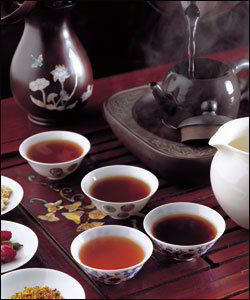Your basket is currently empty!
Tea Tasting
Tea tasting: how it is done and what to find out
Tea tasting is fundamental to the discipline of creating and buying good tea. How do professional tea tasters taste tea and what are the benefits?
Ensuring high quality
Tea tasters taste all types and grades of tea to ensure that each meets the expectations of the customer – whether that be a tea blending house or the consumer for a self-drinker. It is important to check that the tea was produced to a good standard that means that there have been no contaminants or aspects of the manufacturing process that have led to the tea becoming tainted in any way.
Creating Blends
For blended teas tea tasters are employed to source the appropriate teas to give a blend its notable character. Once created this needs to remain consistent from month to month and year to year. Customers buy blends for their recognisable flavour and this needs to be maintained no matter what changes there are in the taste of the constituent teas from one harvest to the next. Of course market prices for these teas can vary too and the tea taster must aim to keep not only the taste but the cost of the tea to a satisfactory level.
Teas are grown in many countries of the world, especially in Asia so some teas can be substituted from one garden to another, one region to another or even to a different country of origin. By skillful blending the final taste of the blend can be maintained despite changes in the quality of harvests and prices demanded for these teas.
Single Origin Teas
Many teas are sold for consumption as a self-drinker in that they are not blended. Consumers buy these teas for their individual characteristics but they will still require the services of an experienced tea taster to ensure that it is a good example of the tea the consumer is buying. Sometimes the tea may be better or worse than these expectations and this will be reflected in the price that the tea producer can ask for his tea.
Not all single origin teas will have the same taste as time of picking will have a bearing on the character of the tea. Compare the light and brisk qualities of a first flush Darjeeling compared with the smoother, fuller bodied and fuller flavour that can be expected form a Darjeeling second flush.
Tasting the tea
Tea tasters are highly trained people that have a finely tuned sense of taste. They may have to taste two to four hundred teas each day and have to distinguish between two thousand different teas. These abilities can take four years to acquire.
When tasting a tea they are looking for the presence of positive virtues for which that tea is known as well as negative signs that may be indicative of poorer quality. Appearance and aroma of the dry leaf will be important but fundamentally it is the taste of the infused leaf which will be the acid test for that tea.
To achieve objective comparisons between teas they are tasted according to strict standard weights of loose tea, volume of boiling water and length of infusion. Generally 6 grams is infused for five minutes, depending upon the type of tea. Tasting porcelain is in three parts: a ceramic cup, a fitted lid, and the liquor is then poured into special broad tasting vessel.
First when tea tasting observe the leaf – its colour, form, size and the presence of any tip. Smell the dry leaf, next smell the infused leaf. Examine the colour of the infusion in the cup and try to describe the aroma by taking repeated sniffs of the tea. The infusion is then taken as a sharp slurp which allows the tea to swill around the whole mouth to let the tea contact those parts of the tongue best able to detect the different flavor components of the tea. The tip of the tongue detects sweetness, the front sides: saltiness, back sides: acidity and the back: bitterness. Taste itself is detected towards the back of the centre of the tongue. The tea is then spat out.
To appreciate tea at home, whilst some attention is worth paying to tea you have bought we can relax and enjoy our tea in the knowledge that experts have been involved at every stage of production and sale to ensure we have an excellent cup of tea.
Ready to do your own tea tasting? Order some tea samples.
